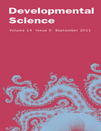Abstract:
Studies of brain development suggest that the increase in risk taking observed during adolescence may be due to insufficient prefrontal executive function compared to a more rapidly developing subcortical motivation system. We examined executive function as assessed by working memory ability in a community sample of youth (n = 387, ages 10 to 12 at baseline) in three annual assessments to determine its relation to two forms of impulsivity (sensation seeking and acting without thinking) and a wide range of risk and externalizing behavior. Using structural equation modeling, we tested a model in which differential activation of the dorsal and ventral striatum produces imbalance in the function of these brain regions. For youth high in sensation seeking, both regions were predicted to develop with age. However, for youth high in the tendency to act without thinking, the ventral striatum was expected to dominate. The model predicted that working memory ability would exhibit (1) early weakness in youth high in acting without thinking but (2) growing strength in those high in sensation seeking. In addition, it predicted that (3) acting without thinking would be more strongly related to risk and externalizing behavior than sensation seeking. Finally, it predicted that (4) controlling for acting without thinking, sensation seeking would predict later increases in risky and externalizing behavior. All four of these predictions were confirmed. The results indicate that the rise in sensation seeking that occurs during adolescence is not accompanied by a deficit in executive function and therefore requires different intervention strategies from those for youth whose impulsivity is characterized by early signs of acting without thinking.
Authors
- Laura M. Betancourt
- Nancy L. Brodsky
- Joan M. Giannetta
- Hallam Hurt
- Daniel Romer
- Wei Yang


